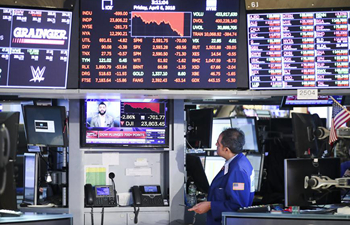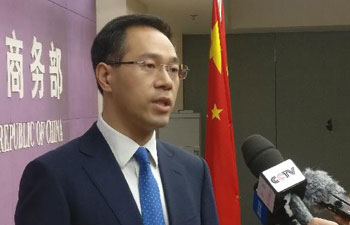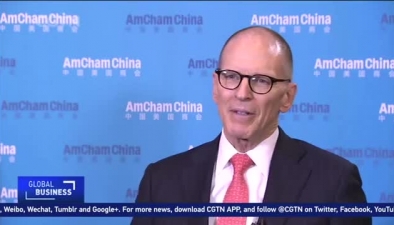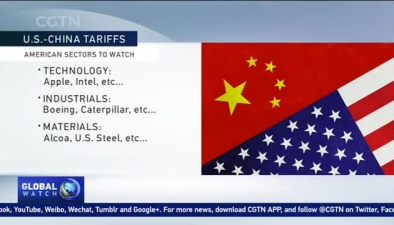WASHINGTON, April 6 (Xinhua) -- U.S. President Donald Trump on Thursday threatened to slap tariffs on 100 billion U.S. dollars of imports from China, drawing strong opposition from China and threatening America's own economic growth.
China will fight "at any cost" and take "comprehensive countermeasures" if the United States continues its unilateral, protectionist practices, a spokesperson with the Chinese Ministry of Commerce said Friday.
"On China-U.S. trade, China has made its position very clear. We don't want a trade war, but we are not afraid of such a war," the spokesperson said.
If the United States continues its protectionism regardless of opposition from China and the international community, China will fight to the end at any cost to "protect the interests of the country and the people," according to the spokesperson.
Earlier this week, the U.S. Trade Representative (USTR) proposed to impose an additional 25 percent tariff on 50 billion dollars of imports from China, which has drawn strong opposition from business groups.
"In light of China's unfair retaliation, I have instructed the USTR to consider whether 100 billion U.S. dollars of additional tariffs would be appropriate under section 301 and, if so, to identify the products upon which to impose such tariffs," Trump said in a White House statement on Thursday.
In response to the Trump administration's series of provocative actions, China has said it would defend its national interests against U.S. trade actions and protectionism.
Trump's actions also stirred up opposition from the American business community, which warns that the United States is heading in the wrong direction by starting a trade war.
"This is what a trade war looks like, and what we have warned against from the start," said Matthew Shay, president of the National Retail Federation, in a statement on Thursday.
"We are on a dangerous downward spiral and American families will be on the losing end," he added.
Shay also said in the statement that these tit-for-tat trade actions could spell disaster for the U.S. economy and make it harder for Americans across the country to afford everyday products and basic necessities.
The American Soybean Association also denounced the Trump administration's tariff plans, saying that it was extremely frustrated about the potential trade war with China, the largest customer of U.S. soybeans.
Following the U.S. tariff proposal on Tuesday, China on Wednesday unveiled a list of products worth 50 billion dollars imported from the United States that will be subject to higher tariffs, which included soybean imports.
China purchases 61 percent of the total U.S. soybean exports, or more than 30 percent of overall U.S. soybean production.
"A 25-percent tariff on U.S. soybeans into China will have a devastating effect on every soybean farmer in America," John Heisdorffer, president of the American Soybean Association, said in a statement on Wednesday.
The association has called on the White House to withdraw the tariffs that had led to the retaliation.
The 100 billion dollars represent about 20 percent of U.S. imports from China last year, some analysts have pointed out. Additional tariffs on these imports would definitely hurt the U.S. economy.
According to research by the Federal Reserve Bank of Dallas, tariffs on steel and aluminum imports would probably reduce the U.S. gross domestic product by 0.25 percentage point over the long run.
Mark Zandi, chief economist with the Moody's Analytics, estimated that the Trump administration's recent tariff plans would reduce U.S. economic growth by 0.1 to 0.2 percentage point over the next 12 months.
If tensions escalate, the drag on the U.S. growth will grow, Zandi warned.













